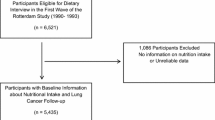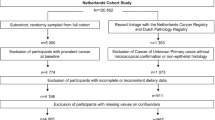Abstract
Background: Although substantial evidence suggests that higher intake of fruits and vegetables can reduce the adverse impact of smoking on lung cancer risk, great uncertainty exists regarding the specific foods and their constituents that are protective. We therefore examine prospectively the relation between cigarette smoking and lung cancer incidence among women, and quantify the associations between dietary antioxidants, other nutrients, and lung cancer risk.
Methods: In a 16-year prospective cohort study (the Nurses'2 Health Study), 593 cases of lung cancer were confirmed during 1,793,327 person-years of follow-up. Dietary data, including vitamin supplement use and food intake, were collected in 1980 using a validated semiquantitative food frequency questionnaire.
Results: The risk of lung cancer increased with the number of cigarettes smoked and with early onset of cigarette smoking. The risk decreased rapidly with the discontinuation of smoking but took 15 years to fall to about the level of risk for women who had never smoked. Dietary intake of fat was not related to the risk of lung cancer. Although β-carotene intake was not related to risk, intake of carrots showed a strong inverse relation: women who reported consuming five or more carrots per week had a relative risk of 0.4 (95% CI = 0.2–0.8) compared with the risk for women who never ate carrots.
Conclusions: Smoking is the most important risk factor for lung cancer in women, as it is in men. Higher vegetable consumption, particularly of carrots, may significantly reduce the risk of lung cancer, but dietary modification cannot be considered a substitute for smoking prevention and cessation.
Similar content being viewed by others
References
Thun M, Dally-Lally C, Myers D, et al. (1997) Trends in tobacco smoking and mortality from cigarette use in Cancer Prevention Studies I (1959 through 1965) and II (1982 through 1988). In: Burns D, Garfinkel L, Samet J, eds. Changes in Cigarette-related Disease Risk and their Implications for Prevention and Control. Washington, DC: NIH Publication no. 97-4213, pp. 305-333.
Friedman G, Tekawa I, Sadler M, Sidney S (1997) Smoking and mortality: the Kaiser Permanente experience. In: Burns D, Garfinkel L, Samet J, eds. Changes in Cigarette-related Disease Risk and their Implications for Prevention and Control. Washington, DC: NIH Publication no. 97-4213, pp. 477-499.
US Department of Health and Human Services (1989) Surgeon General's Report. The Health Consequences of Smoking. Washington, DC: Government Printing Office.
Wu A, Yu M, Thomas D, Pike M, Henderson B (1988) Personal and family history of lung disease as risk factors for adenocarcinoma of the lung. Cancer Res 48: 7279-7284.
Speizer F, Samet J (1994) Air pollution and lung cancer. In: Samet J, ed. Epidemiology of Lung Cancer. New York: Marcel Dekker, pp. 131-150.
Wu AH, Henderson BE, Pike MC, Yu MC (1985) Smoking and other risk factors for lung cancer in women. J Natl Cancer Inst 74: 747-751.
Alavanja MC, Brown CC, Swanson C, Brownson RC (1993) Saturated fat intake and lung cancer risk among non-smoking women in Missouri. J Natl Cancer Inst 85: 1906-1916.
Gerster H (1993) Anticarcinogenic effect of common carotenoids. J Vit Nutr Research 63: 93-121.
Steinmetz KA, Potter JD (1991) Vegetables, fruit, and cancer. II. Mechanisms. Cancer Causes Control 2: 427-442.
Ziegler RG, Mayne ST, Swanson CA (1996) Nutrition and lung cancer. Cancer Causes Control 7: 157-177.
Albanes D, Heinonen OP, Huttunen JK, et al. (1995) Effects of alpha-tocopherol and beta-carotene supplements on cancer incidence in the Alpha-Tocopherol Beta-Carotene Cancer Prevention Study. Am J Clin Nutr 62(Suppl. 6): S1427-S1430.
Hennekens CH, Buring JE, Manson JE, et al. (1996) Lack of effect of long-term supplementation with beta carotene on the incidence of malignant neoplasms and cardiovascular disease. N Engl J Med 334: 1145-1149.
Omenn GS, Goodman GE, Thornquist MD, et al. (1996) Effects of a combination of beta carotene and vitamin A on lung cancer and cardiovascular disease. N Engl J Med 334: 1150-1155.
Le Marchand L, Hankin JH, Kolonel LN, Beecher GR, Wilkens LR, Zhao LP (1993) Intake of specific carotenoids and lung cancer risk. Cancer Epidemiol Biomarkers Prev 2: 183-187.
Ziegler RG, Colavito EA, Hartge P, et al. (1996) Importance of α-carotene, β-carotene, and other phytochemicals in the etiology of lung cancer. J Natl Cancer Inst 88: 612-615.
Willett WC, Green A, Stampfer MJ, et al. (1987) Relative and absolute excess risks of coronary heart disease among women who smoke cigarettes. N Engl J Med 317: 1303-1309.
Kawachi I, Colditz G, Stampfer M, et al. (1993) Smoking cessation and time course of decreased risk of coronary heart disease in women. Arch Intern Med 154: 169-175.
Colditz GA, Bonita R, Stampfer MJ, et al. (1988) Cigarette smoking and risk of stroke in middle-aged women. N Engl J Med 318: 937-941.
Kawachi I, Colditz GA, Stampfer MJ, et al. (1993) Smoking cessation in relation to total mortality rates in women: a prospective cohort study. Ann Intern Med 119: 992-1000.
Colditz GA (1995) The Nurses' Health Study: A cohort of US women followed since 1976. J Am Med Womens Assoc 50: 40-44 and 63.
Stampfer MJ, Willett WC, Speizer FE, et al. (1984) Test of the National Death Index. Am J Epidemiol 119: 837-839.
Rich-Edwards J, Corsano K, Stampfer M (1994) Test of the National Death Index and Equifax Nationwide Death Search. Am J Epidemiol 140: 1016-1019.
Willett WC, Sampson L, Stampfer MJ, et al. (1985) Reproducibility and validity of a semiquantitative food frequency questionnaire. Am J Epidemiol 122: 51-65.
Willett WC (1998) Nutritional Epidemiology, 2nd edn. New York: Oxford University Press, 1998.
Chug-Ahuja JK, Holden JM, Forman MR, Mangels AR, Beecher GR, Lanza E (1993) The development and application of a carotenoid database for fruits, vegetables, and selected multicomponent foods. J Am Diet Assoc 93: 318-323.
Willett WC, Stampfer MJ (1986) Total energy intake: implications for epidemiologic analyses. Am J Epidemiol 124: 17-27.
Federal Trade Commisson (1978) Report of “Tar” and Nicotene Content of Smoke of 167 Varieties of Cigarettes. Washington, DC: Federal Trade Commission.
Dockery D, Trichopoulos D (1997) Risk of lung cancer from environmental exposures to tobacco smoke. Cancer Causes Control 8: 333-345.
Blot W, McLaughlin J (1998) Passive smoking and lung cancer risk: what is the story now? J Natl Cancer Inst 90: 1416-1417.
Wattenberg LW (1985) Chemoprevention of cancer. Cancer Res 45: 1-8.
Van Poppel G, Paulsen H, Shopt S, Verkagen H (1995) No influence of beta-carotene on oxidative DNA damage in male smokers. J Natl Cancer Inst 87: 310-311.
Wang X-D, Liu C, Bronson R, Smith D, Krinsky N, Russell R (1999) Retinoid signaling and activator protein-1 expression in ferrets given b-carotene supplements and exposed to tobacco smoke. J Natl Cancer Inst 91: 60-66.
Mangels AR, Holden JM, Beecher GR, Forman MR, Lanza E (1993) Carotenoid content of fruits and vegetables: an evaluation of analytic data. J Am Diet Assoc 93: 284-296.
Subar A, Harlan L, Mattson M (1990) Food and nutrient intake differences between smokers and non-smokers in the United States. Am J Public Health 80: 1323-1329.
Rimm E, Colditz G (1993) Smoking, alcohol, and plasma levels of carotenes and vitamin E. Ann NY Acad Sci 686: 323-334.
Willett W, Colditz G (1998) Vitamin A and lung cancer. In: Willett W, ed. Nutritional Epidemiology. New York: Oxford University Press, pp. 357-376.
Ziegler RG (1991) Vegetables, fruits and carotenoids and the risk of cancer. Am J Clin Nutr 53: 251S-259S.
Murakoshi M, Nishino H, Satomi Y, et al. (1992) Potent preventive action of alpha-carotene against carcinogenesis: spontaneous liver carcinogenesis and promoting stage of lung and skin carcinogenesis in mice are suppressed more effectively by alpha-carotene than by beta-carotene. Cancer Res 52: 6583-6587.
Nishino H (1995) Cancer chemoprevention by natural carotenoids and their related compounds. J Cell Biochem 33(Suppl.): 231-235.
Hinds MW, Kolonel LN, Hankin JH, Lee J (1983) Dietary cholesterol and lung cancer risk in a multiethnic population in Hawaii. Int J Cancer 32: 727-732.
Goodman MT, Kolonel LN, Yoshizawa CN, Hankin JH (1988) The effect of dietary cholesterol and fat on the risk of lung cancer in Hawaii. Am J Epidemiol 128: 1241-1255.
Byers TE, Graham S, Haughey BP, Marshall JR, Swanson MK (1987) Diet and lung cancer risk: findings from the Western New York Diet Study. Am J Epidemiol 125: 351-363.
Wynder EL, Hebert JR, Kabat GC (1987) Association of dietary fat and lung cancer. J Natl Cancer Inst 79: 631-637.
Jain M, Burch JD, Howe GR, Risch HA, Miller AB (1990) Dietary factors and risk of lung cancer: results from a case-control study, Toronto, 1981–1985. Int J Cancer 45: 287-293.
Shekelle RB, Rossof AH, Stamler J (1991) Dietary cholesterol and incidence of lung cancer: the Western Electric Study. Am J Epidemiol 134: 480-484.
Knekt P, Seppanen R, Jarvinen R, et al. (1991) Dietary cholesterol, fatty acids, and the risk of lung cancer among men. Nutr Cancer 16: 267-275.
Xie JX, Lesaffre E, Kesteloot H (1991) The relationship between animal fat intake, cigarette smoking, and lung cancer. Cancer Causes Control 2: 79-83.
De Stefani E, Denco-Pellegrini H, Mendilaharsu M, Carzoglio J, Ronco A (1997) Dietary fat and lung cancer: a case-control study in Uruguay. Cancer Causes Control 8: 913-921.
Heilbrun LK, Nomura AM, Stemmermann GN (1984) Dietary cholesterol and lung cancer risk among Japanese men in Hawaii. Am J Clin Nutr 39: 375-379.
Fraser GE, Beeson WL, Phillips RL (1991) Diet and lung cancer in California Seventh-day Adventists. Am J Epidemiol 133: 683-693.
Kvaåle G, Bjelke E, Gart JJ (1983) Dietary habits and lung cancer risk. Int J Cancer 31: 397-405.
Bandera E, Freudenheim J, Marshall J, et al. (1997) Diet and alcohol consumption and lung cancer risk in the New York State Cohort. Cancer Causes Control 7: 828-840.
Veierod M, Laake P, Thelle D (1997) Dietary fat intake and risk of lung cancer: a prospective study of 51,452 Norwegian men and women. Eur J Cancer Prev 6: 540-549.
Author information
Authors and Affiliations
Rights and permissions
About this article
Cite this article
Speizer, F., Colditz, G., Hunter, D. et al. Prospective study of smoking, antioxidant intake, and lung cancer in middle-aged women (USA). Cancer Causes Control 10, 475–482 (1999). https://doi.org/10.1023/A:1008931526525
Issue Date:
DOI: https://doi.org/10.1023/A:1008931526525




